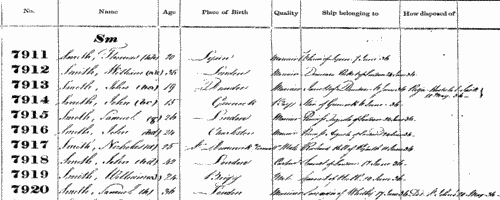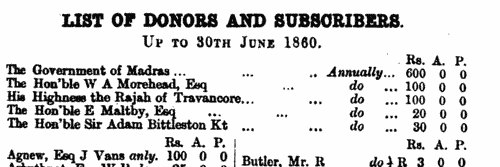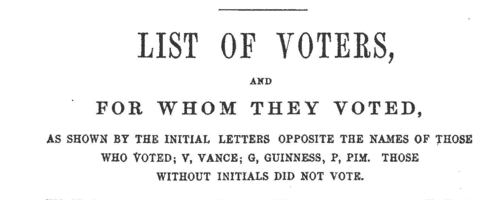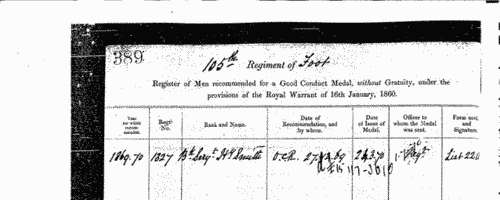Dumphy Surname Ancestry ResultsOur indexes 1000-1999 include entries for the spelling 'dumphy'. In the period you have requested, we have the following 13 records (displaying 1 to 10): Buy all | | | Get all 13 records to view, to save and print for £88.00 |
These sample scans are from the original record. You will get scans of the full pages or articles where the surname you searched for has been found. Your web browser may prevent the sample windows from opening; in this case please change your browser settings to allow pop-up windows from this site.  British merchant seamen
(1835-1836) British merchant seamen
(1835-1836)
At this period, the foreign trade of ships plying to and from the British isles involved about 150,000 men on 15,000 ships; and the coasting trade about a quarter as many more. A large proportion of the seamen on these ships were British subjects, and so liable to be pressed for service in the Royal Navy; but there was no general register by which to identify them, so in 1835 parliament passed a Merchant Seamen's Registration Bill. Under this act this large register of British seamen was compiled, based on ships' crew lists gathered in British and Irish ports, and passed up to the registry in London. Each seaman was assigned a number, and the names were arranged in the register by first two letters of the surname (our sample scan shows one of the pages for 'Sm'); in addition, an attempt was made to separate out namesakes by giving the first instance of a name (a), the second (b), and so on. But no effective method was devised to prevent the same man being registered twice as he appeared in a second crew list; moreover, the original crew lists were clearly difficult for the registry clerks to copy, and some of the surname spellings appear to be corrupted. A parliamentary committee decided that the system devised did not answer the original problem, and this register was abandoned after less than two years: but it is an apparently comprehensive source for British merchant seamen in 1835 to 1836. The register records the number assigned to each man; his name; age; birthplace; quality (master, captain, mate, 2nd mate, mariner, seaman, fisherman, cook, carpenter, boy &c.); and the name and home port of his ship, with the date of the crew list (usually at the end of a voyage). Most of the men recorded were born in the British Isles, but not all (for instance, Charleston and Stockholm appear in the sample scan). The final column 'How disposed of' is rarely used, and indicates those instances where a man died, was discharged, or deserted his ship during the voyage.DUMPHY. Cost: £8.00.  | Sample scan, click to enlarge

|  London Policemen
(1830-1842) London Policemen
(1830-1842)
The Metropolitan Police Register of Joiners (MEPO 333/4) lists policemen joining the force through to 31 December 1842 (to warrant number 19892). The register is alphabetical, in so far as the recruits are listed chronologically grouped under first letter of surname. It is evidently a continuation of a similar earlier register, not closed until its alphabetical sections were filled: consequently, there are no entries in this register for the initial letters N, O, Q, U, V, X, Y or Z; and the sections of this register start at different dates - A 18 April 1840 (warrant number 16894); B 11 December 1830 (5570); C 7 September 1830 (4988); D 27 May 1833 (8445); E 15 December 1838 (14476); F 30 March 1832 (7372); G 1 December 1835 (11,184); H 25 April 1832 (7457); I and J 13 February 1837 (12449); K 2 January 1838 (13457); L 3 October 1834 (9905); M 15 November 1832 (7999); P 4 October 1831 (6869); R 4 September 1837 (13021); S 30 March 1835 (10366); T 6 April 1840 (16829); W 30 December 1833 (9096). The register gives Date of Appointment, Name, Number of Warrant, Cause of Removal from Force (resigned, dismissed, promoted or died), and Date of Removal. Although the register was closed for new entrants at the end of 1842, the details of removals were always recorded, some being twenty or more years later. Those recruits not formerly in the police, the army, or some government department, were required to provide (normally) at least two letters of recommendation from persons of standing, and details of these are entered on the facing pages: the names in these are indexed separately - this index refers only to the police constables. Where a recruit was only recently arrived in the metropolis, the names and addresses of the recommenders can be invaluable for tracing where he came from.DUMPHY. Cost: £8.00.  | Sample scan, click to enlarge

| Assignees of bankrupts' estates in England and Wales
(1849)
Perry's Bankrupt and Insolvent Gazette, issued monthly, included lists of assignees of bankrupts' estates. Each entry gives the name of the bankrupt (surname first, in capitals), and trade; followed by the names, addresses and trades of the assignees to whom the estate was delivered. This is the index to the names of the assignees, from the issues from January to December 1849.DUMPHY. Cost: £6.00.  | Sample scan, click to enlarge

|  Sailors and marines awarded the Baltic Medal
(1854-1857) Sailors and marines awarded the Baltic Medal
(1854-1857)
During the Crimean War, a British and French fleet entered the Baltic, and captured Bomarsund harbour and one of the Aland Islands (now part of Finland). Bomarsund is the sound between the islands and the Swedish island of Vardo; and at the fine harbour on Bomarsund, dominating the entrance of the Gulf of Bothnia, and indirectly that of the Gulf of Finland, the Russians had constructed a northern naval base, and this was destroyed in the attack. The British fleet taking part in the Baltic expedition comprised Her Majesty's ships Aeolus, Ajax, Alban, Algiers, Amphion, Archer, Arrogant, Basilisk, Belleisle, Blenheim, Boscawen, Bulldog, Caesar, Calcutta, Centaur, Colossus, Conflict, Cornwallis, Cossack, Cressy, Cruizer, Cuckoo, Cumberland, Dauntless, Desperate, Dragon, Driver, Duke of Wellington, Edinburgh, Esk, Euryalus, Exmouth, Falcon, Firefly, Geyser, Gladiator, Gorgon, Hannibal, Harrier, Hastings, Hawke, Hecla, Hogue, Imperieuse, James Watt, Leopard, Lightning, Locust, Magicienne, Majestic, Merlin, Miranda, Monarch, Neptune, Nile, Odin, Orion, Otter, Pembroke, Penelope, Pigmy, Porcupine, Prince Regent, Princess Royal, Pylades, Resistance, Retribution, Rhadamanthus, Rosamond, Royal George, Royal William, Russell, St George, St Jean D'Acre, St Vincent, Sphinx, Stromboli, Tartar, Termagant, Tribune, Tyne, Valorous, Volage, Volcano, Vulture, Wrangler and Zephyr. This is the medal roll of the naval and marine claimants who qualified for the Baltic Medal for service in 1854 to 1855. The medals were dispatched in batches from early 1857, the first batch being numbered B A 1, the next B A 2, &c.; then follows the destination (a place or, more usually, a ship) and the date of dispatch. Most of the medals had been sent by the end of 1857.DUMPHY. Cost: £8.00.  | Sample scan, click to enlarge

|  Royal Artillery fighting in China
(1856-1860) Royal Artillery fighting in China
(1856-1860)
The China Medal was awarded to soldiers and sailors who took part in the prosecution of the war against the Chinese from 1856 to 1860. Separate clasps were awarded for men who had been in receipt of the China Medal of 1842; for being actually present at Canton on 28 and 29 December 1857, when that city was bombarded and finally captured; for being actually engaged in the operations which ceased with the first capture of the Taku Forts, 20 May 1858, and led to the Treaty of Tientsin; for being actually present at the capture of the Taku Forts 21 August 1860; and for being actually present before Pekin the day the gate of that city was given up to the allied (British and French) army, viz. on 13 October 1860. Several batteries of the Royal Artillery took part in these actions.DUMPHY. Cost: £8.00.  | Sample scan, click to enlarge

|  British infantry fighting in China
(1860) British infantry fighting in China
(1860)
The China Medal was awarded to soldiers and sailors who took part in the prosecution of the war against the Chinese from 1856 to 1860. Separate clasps were awarded for men who had been in receipt of the China Medal of 1842; for being actually present at Canton on 28 and 29 December 1857, when that city was bombarded and finally captured; for being actually engaged in the operations which ceased with the first capture of the Taku Forts, 20 May 1858, and led to the Treaty of Tientsin; for being actually present at the capture of the Taku Forts 21 August 1860; and for being actually present before Pekin the day the gate of that city was given up to the allied (British and French) army, viz. on 13 October 1860. The 31st (the Huntingdonshire) Regiment of Foot, based at Chatham, embarked for Corfu 24 January 1853, served in the Crimea, had arrived in India by 1859, and was transferred to China in 1860, returning to England in 1863. The regiment took part in the capture of the Taku Forts.DUMPHY. Cost: £8.00.  | Sample scan, click to enlarge

| Supporters of the Madras Civil Orphan Asylum
(1860)
The list of donors and subscribers to the Madras Civil Orphan Asylum, up to 30 June 1860, gives surnames and initials: whether the sum was subscribed annually (anly.) or monthly (mly.) or consisted of donation(s) (don.), in rupees, annas and pies.
DUMPHY. Cost: £4.00.  | Sample scan, click to enlarge

| Dublin Electors
(1865)
This alphabetical list of electors for the City of Dublin for 1865 is annotated with details of the votes cast in the election of 15 July 1865 for a member of Parliament. The candidates were John Vance, Esq., D. L. (V), Benjamin Lee Guinness, Esq., D. L., LL. D. (G), and Jonathan Pim, Esq. (P). The first column gives, in bold, the initial of the ward in which lay the property that was the elector's qualification. The second column gives the elector's sequential number (alphabetically) within that ward. Then the elector's full name is given, surname first, and address, usually including house number. The votes cast are shown on the right: where these columns are blank, the elector did not vote. The key to the ward names is: A, South Dock; B, Donnybrook; C, Rathdown; D, Trinity; E, South City; F, Royal Exchange; G, Mansion House; H, Fitzwilliam; I, Wood Quay; K, Merchants' Quay; L, Usher's Quay; M, Arran Quay; N, Inns' Quay; O, North City; P, Rotundo; Q, Mountjoy; R; North Dock. S indicates the register of freemen.DUMPHY. Cost: £4.00.  | Sample scan, click to enlarge

|  Outstanding soldiers of the 38th regiment of Foot
(1860-1870) Outstanding soldiers of the 38th regiment of Foot
(1860-1870)
The 35th (The 1st Staffordshire) Regiment of Foot embarked for India in 1857, after fighting in the Crimea. It was serving in India in 1860. It helped suppress the Indian Mutiny, took part in the capture of Lucknow, and returned to England in 1872: the regimental depot was at Colchester. Each year just a handful of outstanding soldiers of the regiment were chosen for good conduct medals and gratuities: these are listed here. There were two lists, one for men recommended for the Good Conduct Medal without a gratuity, and one for gratuities - £5 to a private, £10 to a corporal, and £15 to a serjeant. Both lists are indexed here, and each gives rank, name, regimental number, date of recommendation and date of issue. (The sample scan is from the 105th foot)DUMPHY. Cost: £8.00.  | Sample scan, click to enlarge

| Soldiers' Balances Unclaimed
(1882)
The War Office, under 'The Regimental Debts Act, 1863' compiled and published lists of names of deceased soldiers whose personal estate was held by the Secretary of State for War for distribution amongst the Next of Kin or others entitled. These lists give full name (surname first), rank, regiment, and the amount of the estate unclaimed. During 1882 new lists CXLI to CL relating to recent deaths were issued, as well as republications of lists XCI to CL from previous years showing details of balances still remaining unclaimed. DUMPHY. Cost: £6.00.  | Sample scan, click to enlarge

|
| 1 | 2 |  |
Research your ancestry, family history, genealogy and one-name study by direct access to original records and archives indexed by surname.
|













